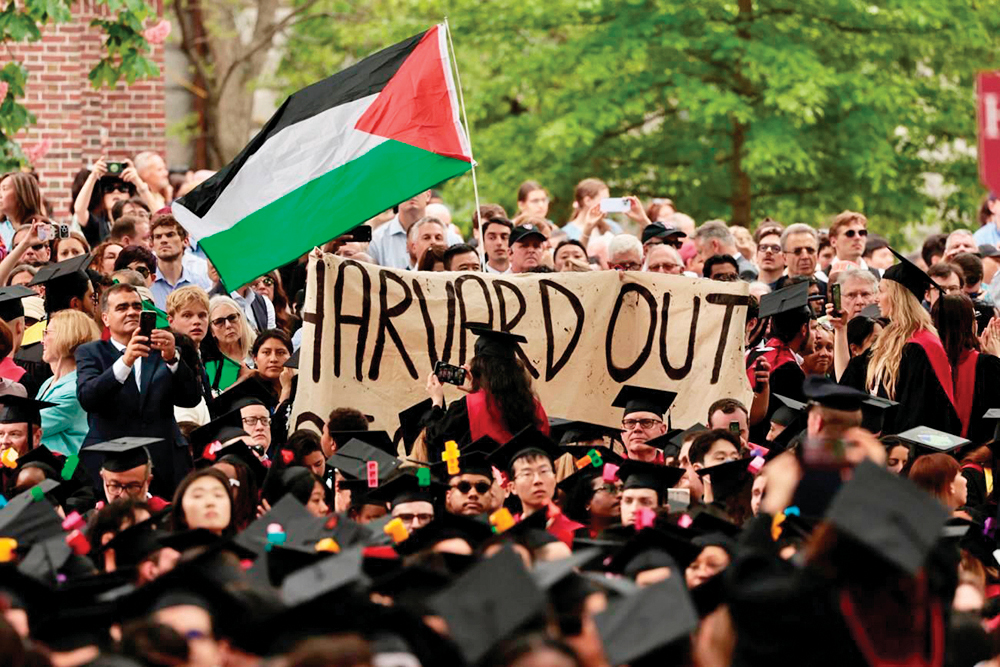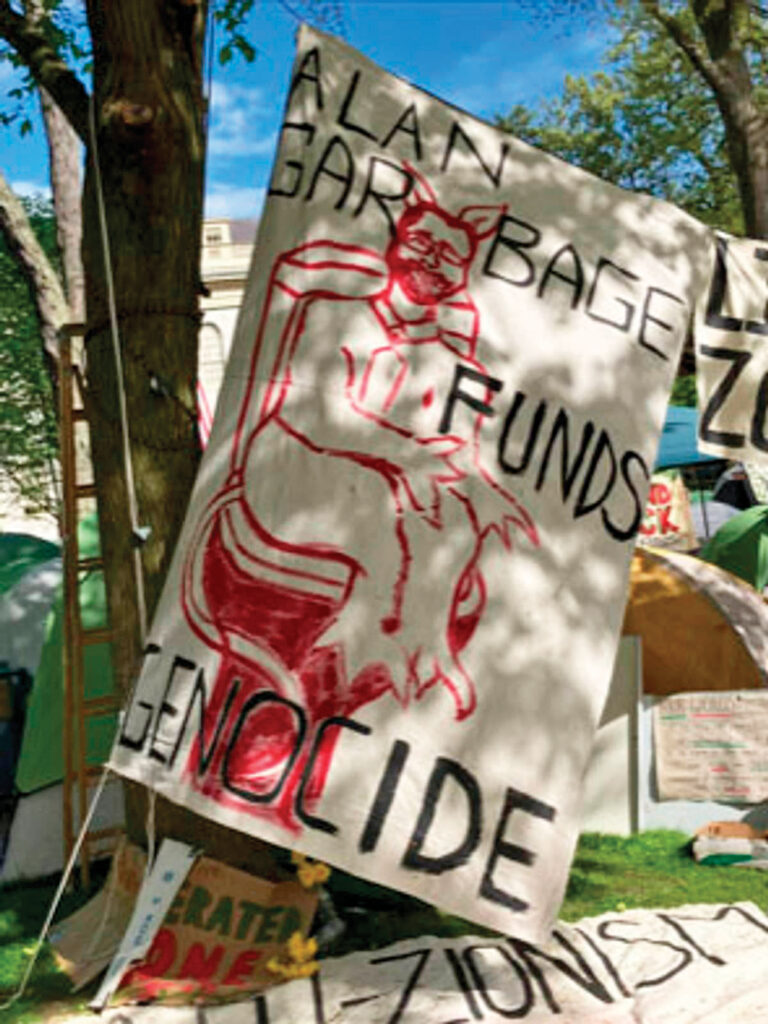Being a Jew at Harvard is way worse than you think.

“I was called antisemitic by power and money because they want power and money.”
Thus said Harvard’s 2024 commencement speaker, Maria Ressa. Fittingly, her deployment of antisemitic tropes in front of tens of thousands of students, professors and families at graduation last week encapsulated the absolute chaos that has engulfed Harvard University for the last year.
Even as I took my seat at commencement, I was handed a newspaper, The Harvard Crimeson (a pun on the country’s oldest newspaper, The Harvard Crimson) which accused Jews of racism for arguing that calls for an intifada are a direct call for violence. The 10-page paper went on to defend chants of “from water to water Palestine is Arab,” “from the river to the sea,” and “globalize the intifada.”
I shouldn’t have been surprised. After all, just the week prior, dozens of students and faculty gathered by the gates of Harvard to gleefully exclaim “intifada, intifada, coming to America.”
This of course followed an almost monthlong illegal encampment of students and professors in the center of Harvard Yard demanding a complete and total divestment from “the Zionist entity.”
Although the participants used bolt cutters in an attempt to break open Harvard’s gates, depicted our Jewish President as a devil replete with horns and a tail, violated all time, place and manner restrictions, called for the violent destruction of the Jewish state, and established a self-appointed security system that monitored and recorded Jews like me on our way to class, they were handsomely rewarded.
In exchange for packing up their foul-smelling tents and open-air laundry, all graduate and almost all undergraduate students had their suspensions revoked. The encampment leaders will meet with senior university officials to discuss a Palestinian studies department, and the Harvard Management Corporation, which oversees Harvard’s $50 billion endowment, will invite them for a seat at the table to discuss divestment, and President Garber personally asked for reinstatements and an expeditious disciplinary process.
That same week, the Harvard antisemitism task force, led by a professor who has repeatedly labeled antisemitism at Harvard as “exaggerated,” quietly updated their timeline. Rather than submit recommendations to combat Jew-hatred during the spring semester as promised, the task force now has a revised date of fall 2024.

Although both the Harvard Jewish Alumni Alliance (HJAA) and the House Committee on Education and the Workforce released damning reports pertaining to the systematic silencing of Jewish and Israeli voices on campus, the university has yet to announce or implement a single policy in response.
In fact, although the reports found that a Jewish student was spat on, an Israeli student was asked to leave class as her nationality made classmates “uncomfortable,” another Israeli was assaulted at the business school, a staff member taunted me with a machete and challenged me to debate the Jewish involvement in the 9/11 terrorist attacks, Harvard didn’t acknowledge these incidents publicly or failed to address them for months.
On the contrary, Harvard recently announced its policy of neutrality, refraining from issuing statements pertaining to public policy or affairs. Just the day before this announcement, the Harvard Palestine Solidarity Committee, which in late April was told to “cease all organizational activities for the remainder of the spring 2024 term,” called for escalating protests to an “open intifada in every capital and city.” Although this university has made it its business to opine on all societal issues from George Floyd to Ukraine, open threats against Jewish students will no longer be denounced.
Paradoxically, this comes as Harvard is fighting in court to dismiss, with prejudice, our lawsuit that alleges pervasive and systemic antisemitism. Their argument? “Harvard is committed to combating antisemitism and ensuring that our Jewish students, faculty, staff and alumni know they are safe, valued and embraced in our community.” Reality tells a different story.
Despite countless op-eds and interviews, seldom are the personal experiences and stories of the students themselves highlighted. As a result, too often Harvard professors themselves belittle the plight of Jewish students and publicly denounce not the antisemitism, but the mere accusations of antisemitism, on campus.
As a Jewish student at Harvard University, I have had my learning interrupted by students calling for the globalization of the intifada, sat directly next to classmates who praised the terrorist groups Hamas, Hezbollah and the Houthis, listened to 34 student groups blame the largest massacre of Jews since the Holocaust on Jews themselves, been exposed to countless death threats, and perhaps most infamously, had a university president who described calls for Jewish genocide to be “context-dependent.”
According to Hillel International, in the 1970s Jews accounted for roughly 25% of Harvard’s student population. In 2023, that number is estimated to be lower than 5%. For Ivy League institutions across America, the percentage plummets are relatively equivalent. Even President Gay’s historic inauguration ceremony, which I proudly attended and which was centered around the causes of “courage” and “diversity,” had no kosher food.
While Harvard took the extraordinary step to raise the Ukrainian flag on its campus following Russia’s illegal invasion of the country, we were told a similar display of solidarity would not be permitted, and the request to fly the Israeli flag after the Hamas attacks was denied. Although Claudine Gay, as dean of the Faculty of Arts and Sciences, immediately sent out an email forcefully condemning the murder of George Floyd and the racial undertones that allowed for it to happen, no equivalent response, certainly not one with such moral clarity, has been issued to Jewish students.
Indeed, the antisemitism and Hamas sympathies are not confined to Harvard students. They extend to, and are promoted by, Harvard faculty.
Earlier in the year, close to 100 Harvard faculty and staff published a cartoon depicting the hand of a Jew, imprinted with the Star of David and the dollar sign, holding nooses around the necks of an Arab and a Black man.
To this day, these faculty have not been disciplined in any way. They continue to teach and spread their poison with impunity. In many cases I have been a student in their classroom, pass them in the hallways and see their names featured prominently on lectures.
Only days later, Harvard proudly hosted antisemite Noura Erakat, who participated on a panel with internationally designated terrorist and senior Hamas official Ghazi Hamad who has promised to repeat Oct. 7 “again and again… Oct. 7, Oct. 10, October one-millionth.”
In early April, Harvard deployed 24/7 private security to stand guard in front of the Palestine Solidarity Committee’s “Apartheid Wall.” The wall was replete with offensive Holocaust imagery and a quote from the U.S.-designated terrorist group Popular Front for the Liberation of Palestine. However, when it came to Chabad installing a menorah during Chanukah, not only did Harvard not provide any security, but also instructed that it be removed each night.
But back to commencement.
While I resigned myself to the hourslong spectacle of each successive speaker lambasting the “genocide in Gaza” and “complicity of the [Harvard] administration,” I was shocked, but not surprised, to see close to 1,000 students, faculty and supporters interrupt the commencement and stage a mass walkout. While yelling about divestment and the supposedly draconian measures of temporarily suspending a handful of antisemitic students, the group demonstrated their hallmark tactic: making the narrative about themselves while ruining a public event for everyone else.
Conveniently, Harvard will no longer have to comment on, let alone denounce, the disaster that was commencement.
While I can provide countless more examples and infuriating testimony, I will conclude with these words: I have seldom experienced such disdain and contempt for a minority group as the way in which Harvard treats its Jewish student population.
This is the reality of being a Jew at Harvard in 2024.
Shabbos Kestenbaum is a graduate student at Harvard University, researching the intersections between public policy and contemporary Jewish life in the United States. He has testified before Congress and is the lead plaintiff against Harvard University alleging pervasive and systemic antisemitism.










